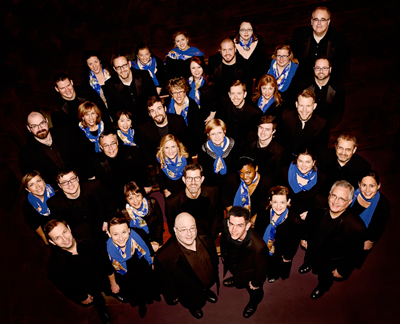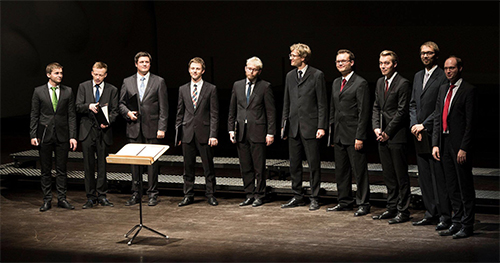by Jarrett Hoffman

“I speak German, so I understood the text and I was literally in tears the whole time,” MacPherson, now founding artistic director of the Cleveland Chamber Choir, told me during a phone interview. “There are all these images of a fire coming down from on high, and of the city once being a beautiful place.”
The name of the piece wasn’t printed in the program — it was a surprise addition to commemorate those lost in the attack — but it turned out to be Wie liegt die Stadt so wüst (“How Desolate Lies the City”) by Rudolf Mauersberger, who died in 1971. The text, from the Lamentations of Jeremiah, tells of the destruction of Jerusalem, while the music was written after the fall of another city: Dresden, firebombed during World War II. “It’s an extremely moving piece,” MacPherson said.
This weekend, MacPherson and his Cleveland Chamber Choir will present that work and eleven others as part of “Remembrance: War, Peace, and Comfort.” The pair of free concerts — Saturday, September 22 at 7:30 pm at First Congregational Church in Akron, then Sunday, September 23 at 3:00 pm at the Maltz Performing Arts Center as part of the Silver Hall Concert Series — will also honor Northeast Ohio’s military veterans. (Reserve Sunday’s tickets here.)
After MacPherson’s trip to Germany in 2001— a sabbatical from Trinity University in San Antonio, where he was director of choral activities — he returned to campus inspired to program Wie liegt die Stadt so wüst. That spring, he and his University choir were preparing the piece for a 9/11 memorial concert when an incredible cultural exchange began to unfold: a Dresden-based men’s chorus, Arcanum Musicae, happened to be visiting San Antonio on tour.
“They got their start as classmates at the Kreuzkirche, where Mauersberger used to work,” MacPherson said. “And they were also members of the choir that sings Wie liegt die Stadt so wüst in a memorial service every February in Dresden — so they know the piece inside and out.”
The Trinity vocalists happily hosted the Dresden group, and MacPherson even had their conductor stay with him. “Then I was bold enough to ask him to bring his group to listen to us rehearse the piece — really their piece. So they saw us rehearse it, and they were moved to tears.”
Over the years, MacPherson has come to consider himself an advocate of the work, having programmed it “around ten times,” at least once with every choir he’s conducted since he discovered it. And his connection with Arcanum Musicae has continued to grow: he would return to Germany years later to guest conduct the group (pictured below).

“The text is all spoken at various levels of dynamics,” MacPherson said. McElheran writes that the text can change at the discretion of the performers, but that it should be made up of the last names of soldiers who have fallen in any war from World War II to the present. This weekend’s performances will draw on the names of soldiers from Northeast Ohio, though no individual name will stick out. “The composer doesn’t want any name to be intelligible because in combat there is no individuality — it’s just all chaos and everyone working together,” MacPherson said.
During a stage change before the piece, the director has also asked every member of the choir to read aloud two names of people close to them who either serve currently or have served in the past. “We’ve printed those names in our program — it’s really amazing to see how much military has been a part of everyone’s lives.”
Closing the first half will be contemporary American composer Aaron Rosenthal’s Voices of Terezín. “The texts were written by children who were in the concentration camp at Terezín,” a city in what was then German-occupied Czechoslovakia, MacPherson said. “In its years of operation, there were 15,000 children at the camp, and only 100 survived. This composer found these texts from a book of poetry and watercolors by the children at the camp called I Never Saw Another Butterfly.”
Filling out the program are works by Mendelssohn, Renaissance-era composers Clément Janequin and Heinrich Schütz, and contemporary composers Joel Martinson, Stephen Chatman, René Clausen, and Peter Louis van Dijk, plus an arrangement by Jonathan Quick.
MacPherson pointed out that November will mark the 100th anniversary of the end of the First World War, and though the timing didn’t work out for this program, he felt that any time is a good time to honor military service members.
Published on ClevelandClassical.com September 18, 2018.
Click here for a printable copy of this article


